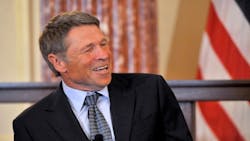WASHINGTON - The wide income gap in the U.S. lives on after retirement as chief executives' retirement assets dwarf the nest eggs of ordinary workers, according to a study released Wednesday.
The 100 largest company-sponsored CEO retirement assets are worth $4.9 billion, said the joint report by the Center for Effective Government and the Institute for Policy Studies.
That amount is equal to the entire retirement account savings of 41% of American families -- about 50 million families or 116 million Americans, the report said.
On average, the CEOs' retirement savings are worth more than $49.3 million each, enough to generate a monthly payment of $277,686 "for the rest of their lives," it said.
"These massive nest eggs are not the result of CEOs working harder or investing more wisely. They are the result of rules intentionally tipped to reward those already on the highest rungs of the ladder," the think tanks said.
Among the benefits tipping the retirement divide in their favor are special tax-deferred compensation accounts where executives can squirrel away an unlimited amount of money to allow it grow until they retire.
But ordinary workers face federal contribution limits on tax-deferred retirement savings plans such as the commonly used 401(k): $18,000 per year, and for those 50 and over, $24,000.
The think tanks called for changing the rules "that allow platinum pensions for CEOs and increase retirement insecurity for the rest of us."
At the top of their list for rich pensions is David Novak, the chairman and former CEO of YUM Brands, parent of Pizza Hut, KFC and Taco Bell, key players in the fast-food sector known for its low-wage jobs. Novak had the largest retirement assets in the Fortune 500 in 2014, at $234 million, while hundreds of thousands of workers at Yum's restaurants "have no company retirement assets," the report said.
YUM Brands spokesman Jonathan Blum defended Novak's compensation, noting that he was an executive with the company for 29 years and that YUM stock "appreciated 900% during his leadership."
The company offers a 401(k) retirement savings plan for employees that matches $1 for every $1 contributed by the employee, up to six percent of the employee's salary, he added.
But the report noted that for workers struggling to make ends meet, it was difficult to set aside savings for retirement.
"Younger Americans face a particularly difficult time saving for retirement. More than half of Millennials have not yet begun to save for retirement, as they lack access to good jobs, and have staggering amounts of student loan debt," the report said.
"Americans under 40 today have saved seven percent less for retirement than people in that age group were able to save in 1983."
Copyright Agence France Presse, 2015
About the Author
Agence France-Presse
Copyright Agence France-Presse, 2002-2025. AFP text, photos, graphics and logos shall not be reproduced, published, broadcast, rewritten for broadcast or publication or redistributed directly or indirectly in any medium. AFP shall not be held liable for any delays, inaccuracies, errors or omissions in any AFP content, or for any actions taken in consequence.
